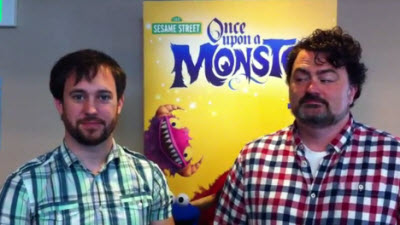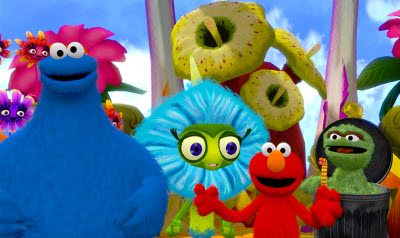 Double Fine Productions doesn’t believe in transitions. Its last game was Brutal Legend, a mature-rated heavy metal fantasy game for headbanging fans. Its new title is Sesame Street: Once Upon a Monster, a Kinect motion-sensing game for the Xbox 360 with plenty of flowers and love.
Double Fine Productions doesn’t believe in transitions. Its last game was Brutal Legend, a mature-rated heavy metal fantasy game for headbanging fans. Its new title is Sesame Street: Once Upon a Monster, a Kinect motion-sensing game for the Xbox 360 with plenty of flowers and love.
But that shows you a little of the diversity of the video game business and how a creative game studio can express itself. The making of this Sesame Street game shows that even a team of hardcore game designers can turn in a new direction if it’s inspired by a new piece of technology — in this case Microsoft’s Kinect motion-sensor. Double Fine has some of the zaniest minds in the video game industry, including founder Tim Schafer (pictured right), and it is interesting to see those minds go to work in the service of a brand like Sesame Street.
 Warner Bros. Interactive Entertainment is publishing Double Fine’s game for the fall, and it recently showed off the title in advance of the E3 video game trade show. Warner bills the game as “a story book come to life.” In the game, you can wave your arms to fly up a flowery vine, get rid of garbage by shooting baskets, and control music with your body. You can create or decorate things or dress up. You can do all of this by moving your body or waving your arms in front of the Kinect system’s 3D motion-sensing camera.
Warner Bros. Interactive Entertainment is publishing Double Fine’s game for the fall, and it recently showed off the title in advance of the E3 video game trade show. Warner bills the game as “a story book come to life.” In the game, you can wave your arms to fly up a flowery vine, get rid of garbage by shooting baskets, and control music with your body. You can create or decorate things or dress up. You can do all of this by moving your body or waving your arms in front of the Kinect system’s 3D motion-sensing camera.
The game is accessible to young kids because they don’t need to know how to use a game controller to play the game. To activate it, you just walk up to the TV and wave your hand. If one player walks out of the picture during a two-player session, the system adapts and switches it to single-player mode. That’s pretty intuitive, and it’s practical for parents who play with kids and have to interrupt the game to answer a phone or watch the stove.
T he game sprang from the brain of Nathan Martz, who dreamed up the game during one of Double Fine’s brainstorming days. Schafer said that Double Fine has a prototyping process where it splits the company up into different groups and holds a two-week jam session where developers create a game in a short time. Martz conceived the game under the code name “Happy Song,” because he wanted it to make you as happy as you feel when you hear your favorite song on the radio.
he game sprang from the brain of Nathan Martz, who dreamed up the game during one of Double Fine’s brainstorming days. Schafer said that Double Fine has a prototyping process where it splits the company up into different groups and holds a two-week jam session where developers create a game in a short time. Martz conceived the game under the code name “Happy Song,” because he wanted it to make you as happy as you feel when you hear your favorite song on the radio.
“It’s an uplifting experience in a beautiful storybook world,” Martz said.
The company got started on the game, teamed up with Warner Bros., and got the license for the Sesame Street characters. While the game is targeted at kids, there are still a lot of inside jokes for adults, said Martz.
The screen shots show scenes from “In the Garden of Weedin” chapter of the game, which introduces themes about protecting nature and making music. The music mini game is clever in that you can bend your knees and move your body lower or higher to change the way the music plays. That’s clever and it gets kids moving. The Kinect recognition could be more accurate, so it’s not easy to shoot baskets. But for kids, it’s fine.

The characters in the game include the familiar Cookie Monster, Elmo, Big Bird, Oscar, and others. The players make friends with zany original monster friends from a storybook called Once Upon a Monster. Each monster has a unique problem, and it’s up to the player or players to solve it.
The game is meant for kids and parents to play together through dancing, jumping or flying. And by the end of it, your kid may learn a thing or two, since the game is guided by social and emotional curriculum from Sesame Workshop, the nonprofit educational organization behind Sesame Street. That means the kids learn lessons about making friends, cooperation, and recognizing emotions.
Schafer says he grew up with Sesame Street and is enjoying playing Once Upon a Monster with his daughter, who is almost three. That’s what you call a labor of love.
 We’ll be exploring the most disruptive game technologies and business models at our third annual GamesBeat 2011 conference, on July 12-13 at the Palace Hotel in San Francisco. It will focus on the disruptive trends in the mobile games market. GamesBeat is co-located with our MobileBeat 2011 conference this year. To register, click on this link. Sponsors can message us at sponsors@venturebeat.com. To participate in our Who’s Got Game? contest for the best game startup, click on this link.
We’ll be exploring the most disruptive game technologies and business models at our third annual GamesBeat 2011 conference, on July 12-13 at the Palace Hotel in San Francisco. It will focus on the disruptive trends in the mobile games market. GamesBeat is co-located with our MobileBeat 2011 conference this year. To register, click on this link. Sponsors can message us at sponsors@venturebeat.com. To participate in our Who’s Got Game? contest for the best game startup, click on this link.
VentureBeat's mission is to be a digital town square for technical decision-makers to gain knowledge about transformative enterprise technology and transact. Learn More
